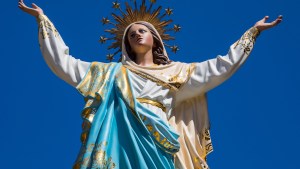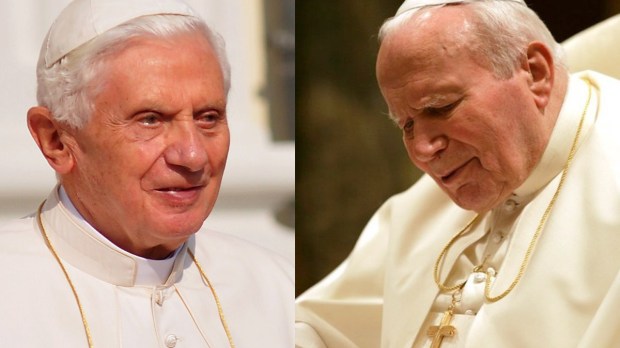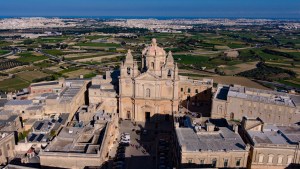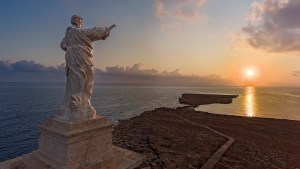John Paul II described Malta, a country he visited twice during his pontificate, as “An island of faith, heroism and devotion.” The Polish Pope made his first apostolic visit to Malta in May 1990, and returned in May 2001, as part of a Mediterranean tour that also took him to Greece and Syria.
Malta first welcomed a pope on May 25, 1990, almost 26 years after it gained independence. At that time the country was 99% Catholic. The 13 meetings conducted by John Paul II during these three days were an undeniable popular success. The Polish Pope was welcomed by “an entire island in celebration” as the Times of Malta recalled 30 years later.
“I must confess that I am admiring not only the natural beauty of these islands and this sea, but also its splendid artistic heritage,” the Pope enthused. His entourage would report that the Polish pope expressed on many occasions, during the various stages of his stay, his attachment to this “gente buona” (good people).
Caution and praise
However, John Paul II was aware of the changes that were beginning to affect the island. He issued this warning to the local clergy: “Your venerable traditions and your society are subject to the flattery of a secularized culture that has already engulfed a large part of the world.”
In a meeting with members of the artistic and intellectual communities, the pontiff expressed similar sentiments, speaking out against the pitfall of a “false culture of appearances,” that are “the result of an unbridled consumer mentality harmful to the deepest needs of individuals and communities.”
But he also pointed out that “thanks to its geographical position and history, Malta presents a wonderful symbiosis of European and Mediterranean cultures.” Pope Francis could naturally take up this theme this weekend.
In the context of the end of the Cold War, John Paul II praised Malta’s position to “observe and take part in the current changes.” He recalled that a few months earlier, in December 1989, Malta had hosted the first summit between Soviet leader Mikhail Gorbachev, who had just visited the Vatican, and U.S. President George H.W. Bush.
During his farewell address, the Pope once again emphasized the Maltese’s loyalty to their cultural and religious heritage. “Your desire to remain faithful to this precious heritage, while you seek to promote your development for the good of all, represents a sign of great hope for the future of Malta,” he said at the end of his 48th apostolic journey.
The conclusion of the Jubilee pilgrimage
The second visit of John Paul II — on May 8 and 9, 2001 — was more difficult and marked by the intense fatigue of the Pontiff. The trip took place a few days before his 81st birthday and occurred at the end of an intense and diplomatically delicate tour of Greece and Syria. The Pope arrived in Valletta on May 8, 2001, sick, and did not manage to read his first speech completely.
This Maltese visit was smaller than the previous one, with only four speeches, but it was a continuation of the Jubilee trips of 2000. “This visit concludes my Jubilee pilgrimage, which has followed in spirit the history of salvation, from Abraham’s homeland at Sinai, where God gave the Ten Commandments, to the Holy Land, where the great events of our Redemption took place. And today, in the footsteps of St. Paul, I have returned to you, dear people of Malta,” said John Paul II as he concluded this ambitious program.
On May 9, 2001, the Pope celebrated the beatifications of three emblematic figures of Maltese Catholicism: the priest George Preca (1880-1962), founder of the Society of Christian Doctrine, Ignatius Falzon (1813-1865), a member of the Franciscan Third Order who evangelized the British soldiers stationed on the island, and the Benedictine nun Maria Adeodata Pisani (1806-1855). “Through the intercession of the new Blesseds, may the Church in Malta move confidently towards a new era of unity and shared responsibility between clergy, religious and laity,” John Paul II asked.
Benedict XVI’s tears in 2010, a turning point in the fight against sexual abuse
“Deeply moved, Benedict XVI expressed his shame and pain for what the victims and their families have endured,” said Father Lombardi after a meeting between the German pope and eight Maltese victims of sexual abuse committed by priests. This discreet meeting, held on April 18, 2010 at the Apostolic Nunciature in Malta, was not filmed, but it was the most significant moment of his pilgrimage in the footsteps of St. Paul, 1,950 years after the shipwreck of the apostle.
Among the men in their 30s and 40s who came to confide their wounds to the Pope, one of them testified to Benedict XVI’s tears and the renewal of his own faith through the pontiff’s sincerity and suffering. “The Pope prayed and wept with us,” confided a participant, admitting that he was “impressed by the humility of the Pope.”
“He took upon himself the embarrassment caused by others. I said I wanted an apology because I was angry,” said this victim. “My anger has subsided now and I am satisfied with my meeting with the Pope. I will continue my battle, not against the Church, but against pedophilia,” he says.
The German pope had already met with victims of abuse during his 2008 visits to Australia and the United States, but without such an echo. He left his image of “great inquisitor” to become that of “great comforter” in international public opinion.
From Malta, Benedict XVI prayed that “all victims of abuse may experience healing and reconciliation, so that they may have the strength to continue their journey with renewed hope,” according to a statement from the Holy See Press Office.
Cardinal Filoni, now Grand Master of the Order of the Holy Sepulchre, was then the substitute for the Secretariat of State. He is one of the few direct witnesses of this meeting in Malta and still remembers it. In a text published last January by L’Osservatore Romano in the context of the Munich report implicating the Pope Emeritus, Cardinal Filoni defended Benedict XVI by recalling this episode.
The Italian cardinal wrote that during his exchanges with the victims, the German pope had “offered the balm of a prayer and the relief of a solidarity in the name of this God who had humbled himself and had taken upon himself the human condition and its sins.”
The shipwreck, a paradoxical opportunity to evangelize
At the risk of disappointing media expectations, in his public interventions in Malta, the German pope nevertheless remained discreet on the subject of abuse. The six speeches of this two-day visit, on April 17 and 18, 2010, are nevertheless marked by a reflection on the mystery of evil and redemption, with the theological subtlety that has always marked the teaching of Joseph Ratzinger.
Five years after his painful meditation on Good Friday 2005 on the Church as “a boat taking on water,” Benedict XVI used the image of St. Paul’s shipwreck in Malta, nearly two millennia ago, to weave a metaphor for a renewal of evangelization.
“I think the motif of the shipwreck tells us something. The shipwreck gave Malta the chance to have faith,” recalls the German pope, with his sense of paradox. “We too can think that the shipwrecks of life can allow the realization of God’s plan for us and serve as new beginnings in our lives,” he confided to journalists on the plane, moments before his arrival on Maltese soil.
“I know that Malta loves Christ and the Church, which is his Body, and knows that even if this Body is wounded by our sins, the Lord still loves this Church, and his Gospel is the true force that purifies and heals,” Benedict XVI said.
His meeting with young people in Valletta was marked by the pain-filled testimony of a young homosexual, who made a real indictment of the Church. “God does not reject anyone. And the Church does not reject anyone,” said Benedict XVI. “However, in his great love, God provokes each of us to transform, to become more perfect,” he explained.
The Pope invites young people to “look to the future with hope, with a deep respect for God’s creation, with a religious respect for human life, with a high regard for marriage and for the integrity of the family! Be good sons and daughters of St. Paul,” Benedict XVI urged in a trip that followed the 2009-2010 Year of St. Paul.
The German pope concluded his farewell address on April 18, 2010 at Valletta airport with these words from St. Paul’s letter to the Corinthians: “Be vigilant, stand firm in the faith, be men, be strong. Let everything in your home be done in love.” The care of the elderly and the culture of respect for life are also specific Maltese characteristics for which Benedict XVI expressed his great esteem throughout his stay in Malta, the 14th apostolic journey of his pontificate.




